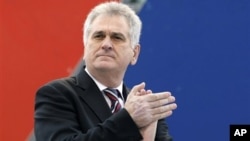Serbia's new president, Tomislav Nikolic, is facing more criticism from the West and the region for denying that the 1995 massacre of Muslims in Bosnia-Herzegovina's eastern town of Srebrenica was genocide.
The United States said it "deplores" the statement made by Nikolic shortly after his inauguration last Thursday, while a Croatian Serb leader called the Serbian president's remarks "harmful" and "unacceptable."
Nikolic told a television interviewer that the massacre of thousands of Muslim men and boys by Bosnian Serb forces in Srebrenica was not a genocide but a "grave crime" whose perpetrators should be brought to justice. The Serbian nationalist beat pro-European incumbent president Boris Tadic in a May 20 run-off election.
U.S. State Department spokesman Mark Toner said Tuesday "genocide" is not a subjective determination in the Srebrenica massacre but a "defined criminal act" confirmed by rulings of the U.N. war crimes court for the former Yugoslavia and the International Court of Justice.
Toner said President Nikolic "has an opportunity to set a constructive tone" in support of regional cooperation following the Balkan conflicts of the 1990s. But, the U.S. spokesman said "unfounded" statements by Nikolic about Srebrenica and other war crimes are "counter-productive to promoting stability and reconciliation."
In another recent controversial interview, Nikolic said Croatia's border town of Vukovar, heavily bombed by Serb forces in the early 1990s, was in fact a "Serb" area to which Croat refugees should not have returned.
Croatian President Ivo Josipovic said he will not attend the formal inauguration of Serbia's new president on June 11 because of the statements. He urged Nikolic to adopt European values and added that Croatia wants to maintain relations with Serbia.
Milorad Pupovac, a prominent member of Croatia's Serb minority, criticized the Serbian president's comments on Vukovar and Srebrenica. Pupovac, who heads the Croatian parliament's foreign affairs committee, said Tuesday that Croatia is ready to resume cooperation with Serbia but will "not tolerate disrespect for the feelings of war victims" and the values that Zagreb wants to spread in the region.
The United States said it "deplores" the statement made by Nikolic shortly after his inauguration last Thursday, while a Croatian Serb leader called the Serbian president's remarks "harmful" and "unacceptable."
Nikolic told a television interviewer that the massacre of thousands of Muslim men and boys by Bosnian Serb forces in Srebrenica was not a genocide but a "grave crime" whose perpetrators should be brought to justice. The Serbian nationalist beat pro-European incumbent president Boris Tadic in a May 20 run-off election.
U.S. State Department spokesman Mark Toner said Tuesday "genocide" is not a subjective determination in the Srebrenica massacre but a "defined criminal act" confirmed by rulings of the U.N. war crimes court for the former Yugoslavia and the International Court of Justice.
Toner said President Nikolic "has an opportunity to set a constructive tone" in support of regional cooperation following the Balkan conflicts of the 1990s. But, the U.S. spokesman said "unfounded" statements by Nikolic about Srebrenica and other war crimes are "counter-productive to promoting stability and reconciliation."
In another recent controversial interview, Nikolic said Croatia's border town of Vukovar, heavily bombed by Serb forces in the early 1990s, was in fact a "Serb" area to which Croat refugees should not have returned.
Croatian President Ivo Josipovic said he will not attend the formal inauguration of Serbia's new president on June 11 because of the statements. He urged Nikolic to adopt European values and added that Croatia wants to maintain relations with Serbia.
Milorad Pupovac, a prominent member of Croatia's Serb minority, criticized the Serbian president's comments on Vukovar and Srebrenica. Pupovac, who heads the Croatian parliament's foreign affairs committee, said Tuesday that Croatia is ready to resume cooperation with Serbia but will "not tolerate disrespect for the feelings of war victims" and the values that Zagreb wants to spread in the region.
Some information for this report was provided by AP, AFP and Reuters.





